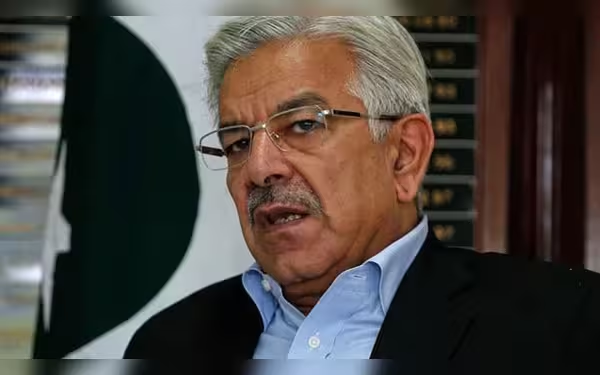Saturday, November 16, 2024 08:31 PM
Khawaja Asif Voices Concerns Over 2024 Election Audit Amid Judicial Changes
- Khawaja Asif warns of election audit risks.
- Judicial reforms face opposition from PTI.
- Bilawal Bhutto Zardari calls for urgent constitutional amendments.
 Image Credits: thenews
Image Credits: thenewsKhawaja Asif raises concerns over potential election audit amid judicial changes and calls for urgent constitutional reforms.
In recent developments, Defense Minister Khawaja Asif has raised significant concerns regarding the potential audit of the upcoming 2024 elections. His apprehensions are particularly focused on the changes within the judiciary, especially with the impending retirement of Chief Justice of Pakistan (CJP) Qazi Faez Isa on the 25th of this month. This situation unfolds as the coalition government is striving to pass a crucial constitutional package aimed at reforming Pakistan’s judicial and parliamentary systems.
During an interview with a private news channel on Tuesday, Khawaja Asif stated, "I pray that the current political strife in the country does not reach a point where this apprehension turns into reality. It can turn very bitter." His remarks reflect a growing unease within the government regarding the stability of the electoral process, especially as he indicated that he had received signals suggesting that his fears might materialize.
These concerns echo sentiments previously expressed by Pakistan Peoples Party (PPP) Chairman Bilawal Bhutto Zardari, who warned of potential confrontation if the proposed amendments to the constitution do not pass before the critical date of October 25. He stated, "Matter will be resolved peacefully, if the amendment passed before October 25 […] Otherwise, the situation would lead to confrontation." This highlights the urgency felt by political leaders as they navigate the complexities of governance and judicial reform.
The government's proposed constitutional amendment bill seeks to extend the service period of judges and establish constitutional courts. However, this initiative has faced staunch opposition from various parties, particularly Pakistan Tehreek-e-Insaf (PTI). Just a day prior, a new petition was filed in the Supreme Court challenging the proposed amendments, arguing that they violate the fundamental principles of judicial independence and separation of powers. The apex court's registrar returned the application with objections, citing that it posed hypothetical questions.
In a related context, Khawaja Asif also mentioned that the government plans to issue a notification for Justice Mansoor Ali Shah to become the next Chief Justice of the Supreme Court, asserting that there are no issues surrounding this appointment. The PTI had previously called for the early announcement of the next top judge, with its founder, Imran Khan, expressing support for Justice Shah on September 25. Khan stated, "The appointment of the next chief justice should be announced soon. [We] completely back Justice Mansoor Ali Shah," during informal discussions with journalists.
As the political landscape in Pakistan continues to evolve, the implications of these developments are profound. The potential for conflict looms large if the government and opposition cannot find common ground on judicial reforms. The upcoming days will be crucial in determining whether the political strife can be resolved peacefully or if it will escalate into a more significant confrontation. Citizens and political observers alike will be watching closely as the situation unfolds, hoping for a resolution that upholds the integrity of Pakistan's democratic processes.













